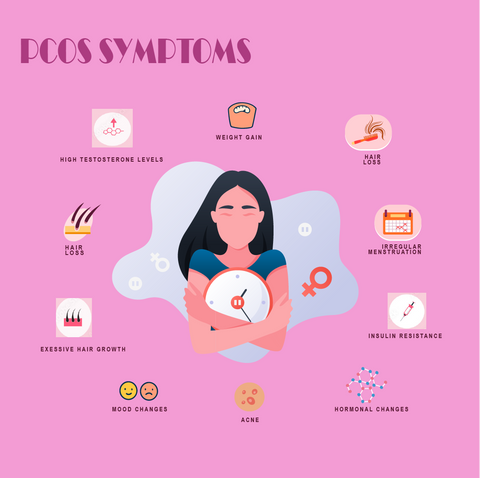
Unveiling the Silent Struggle: Navigating the Labyrinth of PCOS Challenges.
Polycystic Ovaries Syndrome affects millions of women worldwide, yet its complexities often go unnoticed. It is not just a medical diagnosis but a silent and complex journey that many women walk on and struggle with. In today’s post let’s look into the labyrinth of challenges faced by women with PCOS while shedding some light on their silent struggles.
The Silent Epidemic
Did you know that 1 in 10 women of childbearing age is affected by PCOS? That's right! PCOS is a common condition that many women face, and it's time we start talking about it openly and honestly. Despite its prevalence, there are still many myths and misunderstandings surrounding PCOS. Let's work together to dispel these myths and raise awareness about this urgent concern. Together, we can create a more supportive and understanding community for women with PCOS. Many people struggle with this condition that has both physical and mental implications. Unfortunately, this topic is not often discussed, and people who struggle with it may not receive the empathy and support they need. It's important that we raise awareness and educate ourselves about this condition so that we can better understand and support those who are affected by it. Together, we can create a more supportive and understanding community for women with PCOS.
The Hormonal Roller-coaster
The most prominent impact of PCOS on a woman’s body is on its hormonal balance. It's worth noting that elevated levels of androgens, insulin resistance, and irregular menstrual cycles are often considered as common hallmarks. 70-80% of women with PCOS have insulin resistance which is when the cells in your muscles, liver, and fat don't respond adequately to insulin, and according to statistics 50% of women will develop diabetes or pre-diabetes before the age of 40. Hyperandrogenism, a condition of excessive testosterone levels in women, is another symptom that women struggle with and one of the most obvious signs is excessive growth of body hair especially around face and chin area. Hyperandrogenism is a medical condition in which women have unusually high levels of testosterone in their bodies.
This condition can manifest in different ways, but one of the most common symptoms is excessive growth of body hair, especially in the face and chin area. This can be a source of discomfort and embarrassment for many women, and may affect their self-esteem and quality of life. Excessive hair growth in women with hyperandrogenism is often referred to as hirsutism. It is estimated that around 5-10% of women experience hirsutism. In addition to excessive hair growth, other symptoms of hyperandrogenism may include acne, irregular menstrual cycles, and male-pattern baldness.
It is important to note that hyperandrogenism is a medical condition that requires proper diagnosis and treatment. Women who experience excessive hair growth or other symptoms of hyperandrogenism should consult with a healthcare professional to determine the underlying cause and develop an appropriate treatment plan. This may involve lifestyle changes, medication, or other interventions, depending on the individual case. With proper management, women with hyperandrogenism can improve their symptoms and quality of life.

Weight Gain
It's unfortunate that many women with PCOS are often advised to lose weight as the first line of treatment by doctors. This can be frustrating for those who are already struggling with weight gain due to the condition itself. A significant percentage - around 50-60% - of women diagnosed with Polycystic Ovary Syndrome (PCOS) are classified as overweight or obese. Research suggests that women diagnosed with PCOS are 50% more likely to develop obesity compared to those who do not have the syndrome. As a fellow woman suffering with PCOS it often becomes frustrating to deal with all these issues and they do tend to take a toll on one’s emotional well-being.
Emotional Toll
Living with PCOS can be an incredibly challenging experience, both physically and emotionally. It's not just about the visible symptoms like hirsutism and acne, but also the impact it can have on our mental health. Dealing with these symptoms can lead to serious self-esteem issues and anxiety, making it difficult to feel confident and comfortable in our own skin. On top of that, the uncertainty surrounding fertility and long-term health risks can leave us feeling isolated and frustrated. 34% of women struggling with PCOS experience symptoms of anxiety whereas 15% of women report suffering from depression. It's important to recognize the emotional toll that PCOS can take and seek support to help manage these feelings.
Navigating Treatment Options
Dealing with PCOS can be challenging, but there are several ways to manage it effectively. One of the most crucial aspects is making lifestyle changes, such as maintaining a healthy diet and engaging in regular exercise. Besides, medications may be prescribed by a healthcare professional to regulate hormones and improve insulin sensitivity. Having a good support network and seeking support from healthcare professionals can also be extremely helpful in navigating the difficulties of PCOS.
Are you aware that shedding just 5-10% of your body weight can bring about significant relief from PCOS symptoms? This is a proven fact! Moreover, research shows that a whopping 70% of women with PCOS experience at least one comorbidity, such as anxiety, depression, or an eating disorder. It's crucial to prioritize both your physical and mental health to combat this condition effectively.
So why not take the first step towards a healthier and happier you today?
Visit our store for the ideal product, Olen, carefully curated to alleviate the impact of PCOS symptoms and manage diabetic surges during pregnancy.










